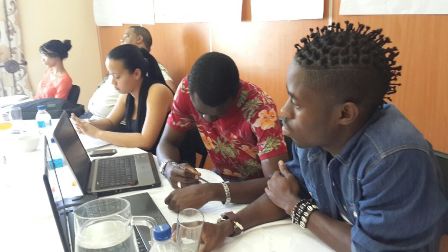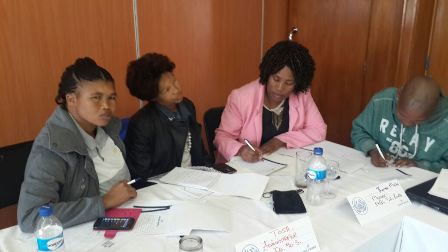|
|
 |
Financial Management National Training - Ondangwa, Namibia
UNESCO Windhoek Office sponsored the Financial Management training, as part of the SIDA funded project “Empowering local radio with ICT’s”, for 5 community radio stations in Namibia. Participants at this training workshop on financial planning, management, income generation and sustainability of local radios included board members responsible for finance, radios’ finance officers, station managers, marketing officers and selected senior editorial staff members.The training workshop took place from 25-29 August 2014 in Ondangwa, Namibia.
|
 The training included 7 men and 9 women from Base FM, Live FM, OCR, !Ah and Namibia Community Broadcasters Network(NCBN). The community radio stations have benefited from this training in terms of discovering opportunities to develop their own funds, managing their funds and to become financially sustainable.
The training included 7 men and 9 women from Base FM, Live FM, OCR, !Ah and Namibia Community Broadcasters Network(NCBN). The community radio stations have benefited from this training in terms of discovering opportunities to develop their own funds, managing their funds and to become financially sustainable.
This workshop objectives were to: Strengthen income generation capacity of the radios, which will in turn benefit its editorial and management work as well as its sustainability; (b) Enhance the ability to generate and nurture diversified income sources for the radio; (c) Use ICTs for fund-raising and commercial purposes; (d) Elaborate and put into practice plans for their financial resourcing for 2014, 2015 and the years to come; (e) Build the capacity of radios to plan and control financial resources (income and expenditure, budgeting, cash flow projection and growth plans); (f) Use ICTs in financial planning and management; (g) Acquire financial practice routines (production of financial statements, presentation of statements to community members, presentation to donors); (h) Acquire financial principles and values (transparency, efficiency, accountability, trust); (i) Exchange good local radio practice, reflecting improved access to locally relevant content per country; (j) Establish standing relations among the radios, beyond project scope; (k) Promote knowledge of the project’s wider relevance to media pluralism and galvanize support to local media. (l) Training content is to be documented for further online posting as an open education resource.
The approaches and techniques of the methodology used during the training aimed at providing hands-on practice as well as participation in all activities. More so, the instruments for the training included a range of financial tools to generate and manage income for sustainability of those radio stations. Visual and audio elements were employed in training to offer clear understanding of the training.
Course participants were introduced to the concepts of media marketing, financial planning and management, financial sustainability, fundraising, budgeting, financial statements to mention a few. The rationale is based on the assumption that community radio stations should be operating like any other organization, which aim to generate profit, which is in this case is known as surplus to keep on carrying its mission.
All radio stations were required to identify one project, which they used as a reference point throughout the training. The two templates from Business in the Box on Marketing Plan and Sustainability Plan were used to show participants how they can use those templates to make sure that their projects are viable and sustainable.
Participants engaged in a highly motivated and creative fashion with the tools and concepts used during the training week. They managed to complete the two template plans, budgeting for the projects and try to find opportunities to fund their projects.To most of them, the training was an eye-opener to all opportunities, which are around them that looked valueless in the beginning.
|
 |
|
|
| Author(s) |
Mwatile Ndinoshiho |
|
|
|
|
|
|
|
|
|
|
|
|
|
|
|
|
|
|
|
|
| Publication Date |
07 Sep 2014 |
|
|
|
|
|
|
|
 |
 |
|

